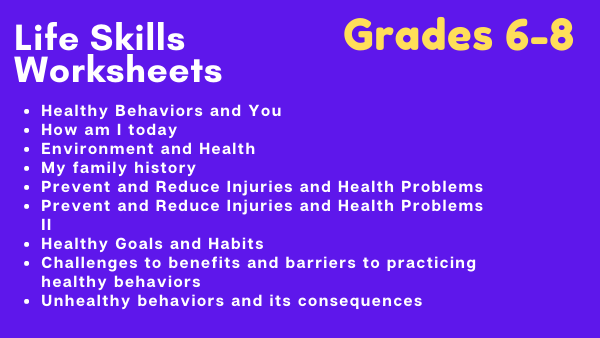9 Best Life Skills Worksheets – Grades 6-8
April 3, 2020 by admin
Life skills can seem like a broad topic but the National Health Education Standards (NHES) helps educators narrow down and understand what needs to be taught. The NHES focuses on what students should know by second, fifth, eighth and twelfth grades in order to be healthy physically, socially, emotionally and intellectually.
The skills taught by the standards include everything from conflict resolution to healthy eating. While these skills are second nature to adults, it is important to understand that the skills need to be taught and reinforced for high school students.
For example, it is important to instill knowledge on traditional and alternative medicine so they can make informed choices when seeking help.
The worksheets each focus on a topic that refers directly back to one of the NHES Standards. Below is a list of the title of each worksheet, the associated National Health Education Standard, the appropriate grade level and the brief description of skills taught by the worksheet.

Life Skills Worksheets – Free Download
Curriculum link – https://www.cdc.gov/healthyschools/sher/standards/1.htm
Worksheet #1: Healthy Behaviors and You
NHES Standard 1.8.1
Grades: 6-8
This worksheet guides students to plan and reflect on their behaviors. Students identify list of healthy behaviors, reflect on their own habits and lifestyle and evaluate why healthy behaviors are important
Worksheet #2: How am I today?
NHES Standard 1.8.2
Grades: 6-8
This worksheet prompts students to reflect on their emotions and feelings. Students identify how they feel, then plan and evaluate possible actions and ways of dealing with these emotions and situations.
Worksheet #3: Environment and Health
NHES Standard 1.8.3
Grades: 6-8
This worksheet explores environments that are prone to poor health. Through images, students identify characteristics of these environments that make their inhabitants prone to poor health and make suggestions on ways that they can improve the environment or make changes to their lives
Worksheet #4: My family history
NHES Standard 1.8.4
Grades: 6-8
This worksheet suggests that family history can influence one’s health. Students identify illnesses that immediate family members may suffer and whether it is a condition at birth or develop later in life, then evaluate possible risks through discussions
Worksheet #5: Prevent and Reduce Injuries and Health Problems
NHES Standard 1.8.5
Grades: 6-8
This worksheet explores ways to prevent and reduce injuries and illnesses in physical settings and social situations. Students identify possible issues with situations and make suggestions on how to prevent or reduce potential injuries or illnesses
Worksheet #6: Prevent and Reduce Injuries and Health Problems
NHES Standard 1.8.6
Grades: 6-8
This worksheet explores ways to prevent and reduce injuries and illnesses in physical settings and social situations. Students identify possible issues with situations and make suggestions on how to prevent or reduce potential injuries or illnesses
Worksheet #7: Healthy Goals and Habits
NHES Standard 1.8.7
Grades: 6-8
This worksheet explores the SMART approach and guide students to plan and adjust their goals and habits to ensure a healthy and balanced lifestyle. Using the SMART approach, students identify goals, and evaluate potential challenges, scope and duration of these goals as they monitor their goals and habits.
Worksheet #8: Challenges to benefits and barriers to practising healthy behaviors
NHES Standard 1.8.8
Grades: 6-8
This worksheet examines barriers that people encounter to practice healthy behaviors due to economic, social, environmental and psychological reasons. Students compare benefits and barriers to maintain healthy behaviors and make suggestions on ways to improve when facing barriers.
Worksheet #9: Unhealthy behaviors and its consequences
NHES Standard 1.8.9
Grades: 6-8
This worksheet illustrates various scenarios of unhealthy behaviors. Students identify the behaviour and explain why they are unhealthy, and make suggestions on ways to prevent or stop these behaviors.